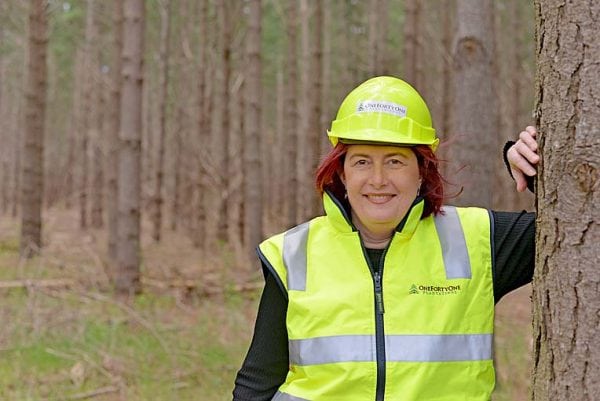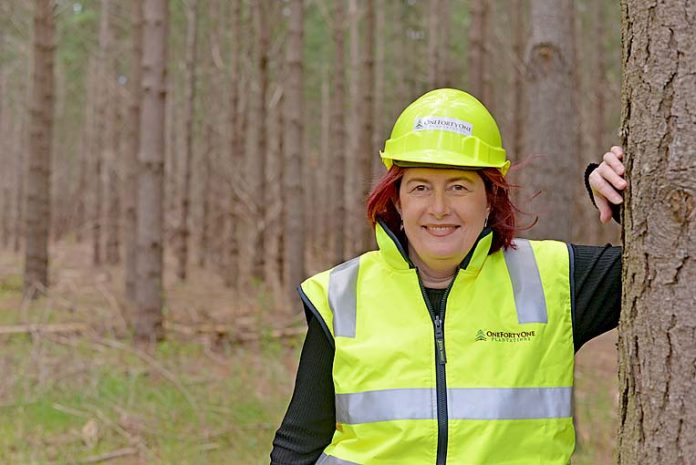
ONEFORTYONE Plantations (OFO) chief executive offer Linda Sewell responds to issues raised in The Border Watch in recent weeks.
This follows concerns being raised over the spike in export logs flowing out of the Port of Portland and questions whether the current harvesting regime is sustainable.
Allegations also emerged regional processors are also not accessing all the logs they need.
The company purchased the state’s softwood estate from the State Government five years ago for $670m.
Much has been written recently about OneFortyOne Plantations, our role and responsibility within our region.
I am pleased that the members of this community, the community in which our OneFortyOne staff, contract and community partners live, have the same passion about sustainable forestry as we do.
It’s a great reminder of how strongly people feel about our industry. It has also prompted me to clarify some of the misinformation that has been circulating.
First and foremost, we take our role as custodians of the forest very seriously, and are committed to meeting all the conditions of our agreement with the South Australian Government.
We are also certified to the internationally recognised Australian Standard for Sustainable Forest Management.
This means that each year, our systems and operations are comprehensively audited by 3rd party independent Australian forest experts who check that we are acting sustainably from economic, social, cultural and environmental perspectives.
We have never received a major non-conformance. This is a fantastic achievement and we are understandably proud of our team.
The management of the plantation is undertaken by our skilled foresters who forward plan not just for the next 25 – 30 years but for the next 75 years. To suggest that our forestry teams are not acting sustainably is entirely unfair and untrue.
There also seems to be an incorrect perception that we are exporting logs and not offering them domestically.
That is not the case. OFO is the only forest manager to supply every mill and processor in this region.
In fact, since we have managed the Green Triangle estate we have increased domestic supply by 45pc.
While our customers will always demand more product from us we are mindful of ensuring sustainable growth and maintaining the average forest clear-fell age per our agreement with the SA Government.
We have always prided ourselves on our commitment to transparency both with the community and our customers particularly on matters such as export.
Much of the product that is exported is called pulplog – the product that results from forest thinning. Thinning is the process used to remove the smaller trees from the plantation.
Rather than leave them on the ground to rot we have improved the health of the forest and reduced the risks of pests and diseases attacking the trees. This is also an important part of fire preparedness as they are removed ahead of summer.
Previously there was a local mill that would have taken this product but it has closed – so we are still getting through more than five year’s backlog of this product.
This may account for why people think more is going to export. To further allay any concerns, we will also engage an independent probity expert to review our next tender process, as we did in 2013.
Export has boosted our local economy. Green Triangle harvest and haulage contractor partners have more work because we have increased harvesting to get through the overdue thinning operations.
The mechanics that service their machines and tyre companies that supply them have more work.
The local shops that our forest and transport workers spend their earnings on have more income. In Portland alone, our export program has created more than 50 new jobs.
If we stop export, then we would have to delay thinning the forest or leave wood to rot on the ground unnecessarily increasing the potential risk of fire.
Our harvesting and haulage contractors would have less work and our domestic customers would receive lower quality wood.
Suggesting the local forestry industry is in some way undermined by export is simply not true. In fact, putting a halt to export operations would have a damaging impact on local confidence and industry.
We welcome discussion about our role and responsibility, but we are mindful that the discussion is informed by fact, not by perception. I would welcome anyone who is interested in learning more about our role and the commitment we have to the local industry and community to get in touch with our Mount Gambier team.








